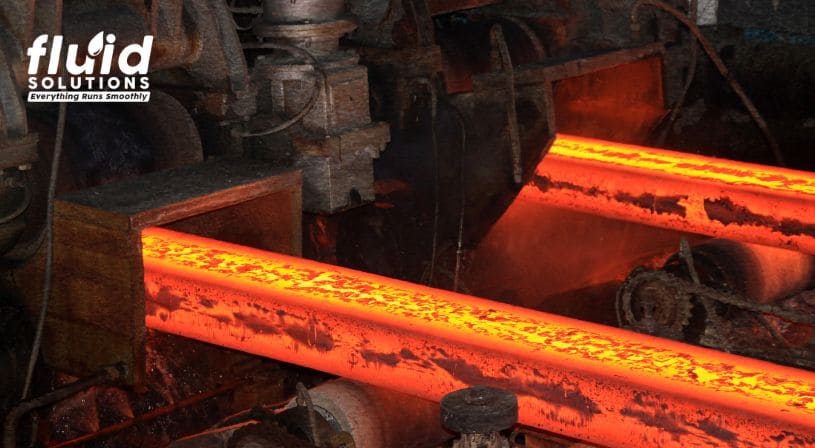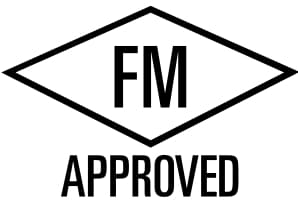
Image Source: https://depositphotos.com/photos/steel-ingots-furnace.html?qview=50848603
Introduction to Fire-Resistant Hydraulic Fluids (FRHFs)
Hydraulic systems are integral to a wide variety of industries, including manufacturing, metalworking, mining, and energy production. However, the use of mineral oils as hydraulic fluids presents significant fire risks. These oils are highly combustible, with a flash point of less than 250°C, meaning they can easily ignite in environments with high heat, open flames, sparks, or molten metal. This particularly concerns industries where hydraulic systems operate in proximity to these hazards. As such, fire resistant hydraulic oils are critical in mitigating risks in these environments.
Fire Resistant Hydraulic Fluids (FRHFs) minimize fire hazards in applications where traditional mineral oils could otherwise cause significant damage. While mineral oils are effective as hydraulic fluids, they are far from ideal when fire safety is a priority. Hydraulic fluid safety must be a top concern in operations that depend on high temperatures or involve open flames, such as foundries, steelmaking plants, and forging facilities. In such settings, the use of fire-resistant hydraulic oils is not just recommended, but essential to protect both the machinery and the workforce.
Risks of Using Mineral Oils in High-Temperature Environments
There are many risks associated with using mineral oils in hydraulic systems. One of the primary concerns is hydraulic fluid flammability. Hydraulic systems often involve complex networks of pipes, joints, seals, and hoses that experience wear. As these components degrade, they become prone to leakage, which can produce an oil mist. This mist, when exposed to a heat source or spark, dramatically increases the risk of ignition.
Potential Hazards because of Leaks or Oil Mist Formation:
Damaged or worn-out parts in hydraulic systems create the potential for oil mist formation or leakage. Oil mist is dangerous as it can spread over large areas, significantly increasing the chance of a fire outbreak. Oil leaks can accumulate near hot machinery parts, creating localized hazards that are difficult to detect before a fire ignites.
Overview of Losses from Hydraulic Fluid Fires:
- Production Losses: When a fire occurs in an industrial facility, operations may need to be halted for days or even weeks. The cost of production downtime can be astronomical, especially in industries like manufacturing and energy, where continuous operation is crucial.
- Increased Health & Safety Risks: Fires caused by hydraulic fluid flammability endanger the health and safety of workers. Operators near the fire are at risk of severe injuries or worse.
- Customer Relationship Damage: If a fire forces a halt in production, it can disrupt supply chains and lead to delays in fulfilling customer orders. This not only affects immediate business, but also damages long-term customer trust and reliability.
Applications Requiring Fire-Resistant Hydraulic Fluids
In industries where high temperatures and fire hazards are common, the use of fire-resistant hydraulic oils becomes crucial. Some of the key industries that rely on FRHFs include:
- Die-Casting: Hydraulic systems are often exposed to molten metal and extremely high temperatures, creating a significant fire risk.
- Foundries: The high-temperature environment of foundries makes mineral oil alternatives necessary to mitigate fire hazards.
- Iron and Steelmaking: These industries involve intense heat, open flames, and molten metal, all of which increase the potential for fires if mineral oils are used.
- Forging: Like steelmaking, forging involves high-heat processes that elevate the risks associated with hydraulic fluid flammability.
- Mining: The hazardous environments in mining operations make fire resistant hydraulic oils critical for both equipment safety and worker protection.
- Power Plants: Power generation facilities often operate under high temperatures, where industrial hydraulic fluids must provide fire resistance to ensure safety and uninterrupted operation.
In these industries, transitioning to fire resistant hydraulic oils helps significantly reduce the risk of fires, protecting both production facilities and their workforce.
Types of Fire-Resistant Hydraulic Fluids
Fire Resistant Hydraulic Fluids are classified into three main categories based on their fire resistance properties and lubrication performance:
Oil and Water Emulsions
These are basic fire-resistant hydraulic fluids with moderate fire resistance properties. Their water content helps to reduce flammability, making them suitable for certain applications where fire hazards are present.
Water-Polymer Solutions
These fluids offer better fire resistance than oil-water emulsions and are often used in industries with intermediate fire risks. They are commonly applied in environments requiring both fire resistance and reliable lubrication.
Anhydrous (Water-Free) FRHFs
These advanced hydraulic fluids provide the highest level of fire resistance. Anhydrous FRHFs are effective in high-risk environments like steelmaking and mining, where performance and fire safety are paramount. These mineral oil alternatives are designed for extreme operating conditions where the highest fire resistance is required.
Understanding Flammability and Fire Resistance
It is important to note that while fire resistant hydraulic oils significantly reduce the spread of fires, they do not completely prevent fires from occurring. FRHFs, when exposed to a heat source, will burn. However, unlike mineral oils, they do not propagate or speed up combustion. Instead, they suppress the spread of fire, providing critical time for workers to evacuate and allowing firefighting personnel to take control of the situation. In this way, FRHFs play a vital role in reducing the overall risk associated with hydraulic fluid fires.
Certification and Compliance

One of the most important factors when selecting a fire-resistant hydraulic oil is ensuring ithas been certified by Factory Mutual (FM), an American mutual insurance company that tests and certifies lubricants based on their fire-resistance properties. The FM APPROVED mark is a globally recognized certification that verifies a lubricant’s fire-resistant capabilities. It is essential to note that, while FM certification confirms fire resistance; it does not guarantee a fluid’s lubrication performance. Ensuring the hydraulic fluid safety of your systems means selecting products that are both fire resistant and suitable for your specific operational needs.
Flushing and Transition Considerations
When transitioning from traditional mineral oils to fire resistant hydraulic oils, one must carefully flush the existing hydraulic systems. Most FRHFs are not miscible with mineral oils, meaning they cannot mix without compromising their fire-resistant properties. Even with anhydrous FRHFs, traces of mineral oil left in the system can reduce the overall fire resistance. Therefore, a thorough system flush is recommended to ensure the complete removal of any mineral oil residues. This will help maintain the full fire-resistant capabilities of the new hydraulic fluid and ensure the safety of the system.
Enhance Safety and Reliability with Our Certified Fire-Resistant Hydraulic Fluids!
Choosing the right fire-resistant hydraulic oils is essential to ensuring the safety and reliability of your operations. At Fluid Solutions, we offer a wide range of industrial hydraulic fluids that are FM APPROVED for fire resistance and designed to meet the needs of high-risk environments. As trusted metalworking fluids manufacturers, we are committed to providing the highest quality products for your industrial applications.
Contact Fluid Solutions today at (02) 8370 5928 / (0917) 894 9156 or via email at inquiry@fluidsolutions.com.ph for personalized consultations and recommendations on the best fire resistance industrial hydraulic fluids for your specific applications. With our certified products, you can enhance both safety and performance in your production facilities.


